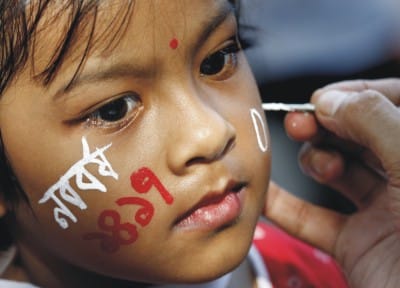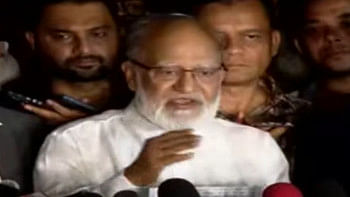The year 1417

Photo: Rashid Shumon
SOMETIMES I wonder what a time-traveller from the past would make of our brave new country in the Bengali year 1417. What would such an observer note about the denizens of our fair nation and how the average Bangladeshi lives and loves.
Surely, the first thing that any visitor from any other realm or time would be struck by is the sheer mass of humanity that pulsates within our 55,000 square miles.
It always amuses me to think that back before independence, when the population was some 75 million, we thought then that the country was grievously over-populated.
Lord help us now that we have doubled to 150 million while the land area has actually diminished somewhat due to riverbank erosion, rising coastal waters, and other inexorable forces of nature.
Dhaka, for most of its history a sleepy and tranquil backwater, today teems with upwards of 12 million citizens crammed in cheek by jowl, living, for the most part, in suffocating concrete boxes, unpainted and charmless, piled one on top of the other.
Every day brings thousands more migrants, hungry to try their luck in what is now one of the most populous and most crowded metropolises on the planet.
The percentage of the population living below the poverty line has halved since independence, but, as the population has doubled, the number of these unfortunate souls, 60 million, remains the same.
A time-traveller from the 19th or pre-independence 20th century, when famine and pestilence routinely stalked this benighted corner of the globe, would, however, surely be impressed with some of our post-independence achievements.
Bangladeshis are today taller, better nourished, better educated, longer-lived, more prosperous, and healthier than at any time in the past two centuries.
We look different now. In the year 1417, lungis and ganjis are being replaced by shirts and trousers. Footwear is common, not a luxury. Sunglasses, hair-gel, and ear-rings are the fashion accessories of choice for the young and stylish.
For their part, young women are trading in their saris for salwar kameezes, the more daring for fatuas and tight jeans. Make-up and beauty products are no longer solely the province of the westernised upper-classes.
Some things never change. On our Bengali new year's day, armies of young women flock to the streets with flowers entwined in their hair and in midriff-baring red and white saris that would make Britney Spears blush.
Where once women were confined to the home, today, at dusk, the streets of the capital are filled with the 3 million garment workers wending their way home after a hard day's work.
In the year 1417, television is everywhere. Even the slums have access to illegal cable, and the exploited garment worker can come home to enjoy her choice of the dozens of television stations on the air.
The typical choice of a Bangladeshi viewer today is one of the Indian stations showing Indian Idol or IPL cricket or one of the interminable and trashy daily soap operas. As a result, we all now secretly understand, if not speak, Hindi perfectly well.
The concrete pill-boxes that clutter the Dhaka sky-line and the honking and pulsing congestion at street level are new. In one sense, these are signs of prosperity and development, but then again, no one but an economist would argue that this represents any kind of improvement.
In the year 1417, we have 50 million mobile phones. The middle classes possess material comforts such as air conditioners and gas cookers and refrigerators that their parents' and grandparents' generations could scarcely have imagined.
But not all is well. Demand for power so outstrips the supply that there is daily load-shedding for hours at a time. Mind-bogglingly, in this land of water, there is a shortage of water fit to drink, cook with, and bathe in.
We have fast-food chains on every corner. Multi-national corporations recruit BBAs from the dozens of private universities, tempting them with offers of plush air-conditioned offices, company cars, and fat expense accounts.
In the year 1417, your average Bangladeshi will be told that he or she never had it so good. He never ate better or enjoyed more modern conveniences or more opportunities to better himself and his family.
Nevertheless, he will spend his entire time plotting his exit. Lines for visas form at embassies from before dawn. The best and the brightest dream only of moving abroad to study and settle, and the poor and the miserable remain eager to sell themselves into virtual slavery to escape these shores.
It is the year 1417.

 For all latest news, follow The Daily Star's Google News channel.
For all latest news, follow The Daily Star's Google News channel. 



Comments